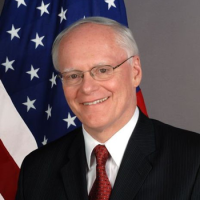Business As Usual or Time for Change? Revisiting U.S. Strategy in the Middle East
On April 21, MEP and RAND Corporation co-hosted a roundtable featuring experts from a variety of think tanks who have recently issued reports on U.S. Middle East strategy. With the start of a new Administration, this is an opportune moment for Washington to rethink some of the fundamental premises underlying American policymaking in the Middle East and to review how America engages the region. The experts compared ideas and approaches, exploring whether new policy directions are possible for a region still mired in conflict.
Dalia Dassa Kaye, Wilson Fellow and Former Director the Center for Middle East Public Policy at the RAND Corporation, argued that “legacy thinking” in the United States’ results in heavy military investment that far outpaces economic and diplomatic investment. The RAND report Reimagining U.S. Strategy in the Middle East found over 50 percent of the US global military assistance goes to the Middle East, yet the region receives less than 6 percent of US global economic assistance. Further, “There is a concentrated set of partners. Israel, Egypt, and Jordan get 81 percent of all military assistance, and most of that is on high-priced armaments… not necessarily military assistance that would meet the needs of our partners in today’s conflicts.”
Ilan Goldenberg, Senior Fellow and Director of the Middle East Security Program at Center for New American Security (CNAS), put forth the US historically escalates and takes sides in regional conflicts, rather than reduce tensions. His team at CNAS found Presidents Bush, Obama, and Trump failed to fulfill their election promises of pulling out of the region. Goldenberg contended this challenge arises when local civil wars erupt into regional proxy wars, demanding major US support. In addition to diplomatic strategies aimed at de-escalating conflict, the US should focus on finding, “local, legitimate actors on the ground. We can do this both cheaper and better.”
Michele Dunne, Director and Senior Fellow of the Middle East Program at Carnegie Endowment for International Peace, emphasized the changing political economy of the Middle East, specifically trends toward a mixed-energy economy. However, in tandem to these transformations, “There is a lot of trouble because they have not built productive economies that can employ their population.” Dunne believes the US must be mindful of these deficits and engage in the region in a more economically productive way. Currently, though, the US and its allies fail to make, “meaningful contributions to helping these countries to the post-oil era.”
A paradigmatic shift in Middle East strategy
The panelists contended US policy must shift from funneling massive military aid into the region to a diffused, diplomatic approach that benefits local populations and does not incite harmful competition. For example, Kaye argued a more effective way to counter the threat of Iranian expansionism is to support better functioning societies and governments in the region. Iran capitalizes on power vacuums and civil unrest; therefore, shoring up vulnerabilities that arise from socioeconomic crises and corruption can prove a successful strategy.
Dunne believes this entails a return to multilateral, norms- and rules-based diplomacy, which will allow the US to resume its stature as the international partner of choice. While the US fueled regional wars, China, “is the one going in there and engaging heavily on tech and infrastructure… helping them move their economies.” Further, US policy failures in the region’s conflicts of the last two decades enabled Russia to augment its military posture and exhibit its prowess. Goldenberg argued, “how you counter that is by demonstrating the US can do meaningful things, but with a positive agenda.”
A bottom-up approach
Historically, the US partners with elites in Middle East countries on policy and ends up contributing to their interests. This mode of policymaking contributes to the significant divide between the state and population. Dunne put forth, “The pandemic pressed the pause button on protest, but that is already being lifted. We are seeing protest return to a lot of Arab countries.” Civil unrest looms from “unfinished business” from the 2011-2012 and 2019 uprisings, and the crises exacerbated by the pandemic. The last year shone a light on economic disparities, especially in the region where elites suffered significantly less compared to the vulnerable and insecure workers across the economy.
The panelists believe US assistance programs must prioritize local actors and Arab populations over its relationships with leaders. Diplomacy can be used to apply pressure on countries to encourage better governance. In this way, protest can be a driver for change and organic reform. Yet, Goldenberg argued that historically when protest crops up, “external actors come swooping in and kill it or exacerbate the problem. This is where intervention can turn small protests into massive proxy wars.” Given civil unrest is essentially inevitable, the US must tailor its approach to support positive outcomes, rather than heighten conflict.
Speakers



Introductions


Director, RAND Center for Middle East Public Policy
Moderator

Former ambassador to Iraq and Turkey, and Special Envoy to the Global Coalition To Defeat ISIS
Hosted By

Middle East Program
The Wilson Center’s Middle East Program serves as a crucial resource for the policymaking community and beyond, providing analyses and research that helps inform US foreign policymaking, stimulates public debate, and expands knowledge about issues in the wider Middle East and North Africa (MENA) region. Read more

